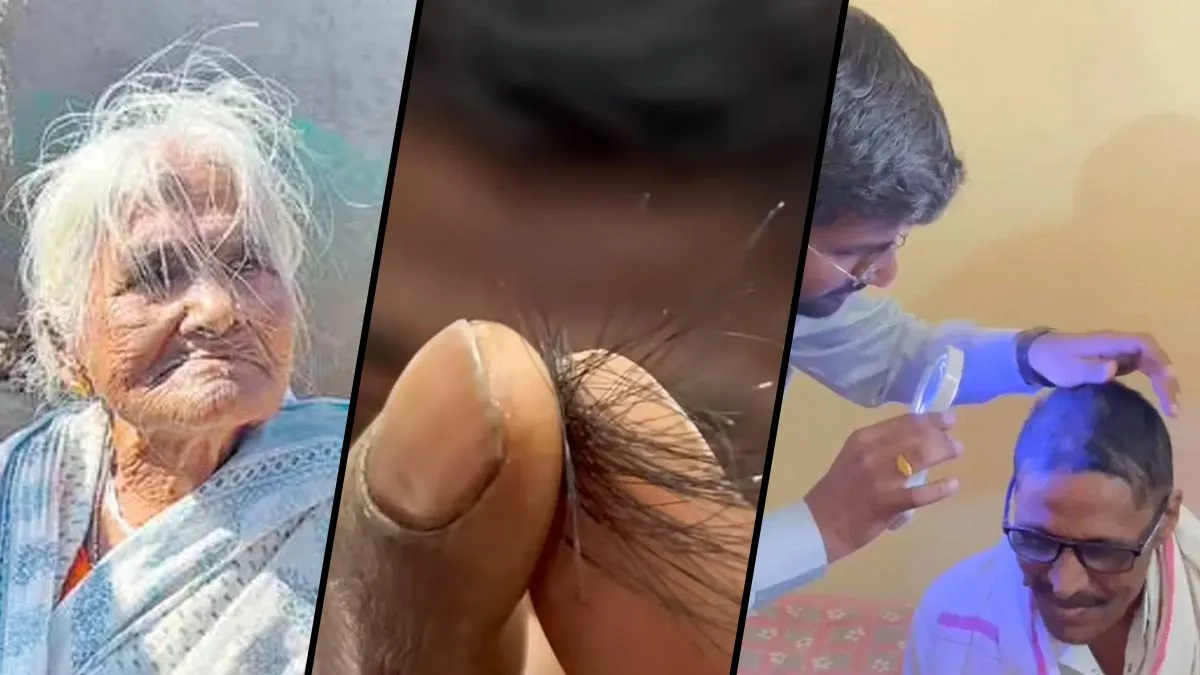
In recent days, a mysterious and alarming phenomenon dubbed the ‘Baldness Virus’ has emerged in several villages of Maharashtra's Buldhana district. The areas particularly affected were Kalvad, Bondgaon, Hingna, and others. Reports indicate that over 150 residents have experienced sudden and severe hair loss, with many becoming completely bald within a mere three days.
Table of Content:-
The condition usually started with a strong itching on the scalp, which was soon followed by quick hair loss. Many residents have said that even a light pull on their hair can cause a lot of it to fall out, leading some people to shave their heads completely out of fear. As health officials investigate this outbreak, here are some tips for scalp care.
Hair Loss Panic Strikes 3 Maharashtra Villages as 30-40 People Suddenly Go Bald
— Sneha Mordani (@snehamordani) January 9, 2025
▶️ Some are going bald within days, sparking anxiety.
▶️ Authorities investigating with water samples and scalp biopsies.
▶️ Locals are shaving heads as hair loss spreads.
▶️ Experts suspect fungal… pic.twitter.com/SUEqYwxQIP
Tips To Care For Scalp
The Indian Journal of Dermatology reports that dandruff is a common scalp condition affecting around 50% of people during their pre-pubescent years, regardless of gender or race. This widespread issue can lead to itching and discomfort, making it important for those affected to seek effective treatments and maintain proper scalp hygiene to alleviate symptoms. Below are some effective tips to care for your scalp.
- Wash Less Often: Limit washing your hair to 2-3 times a week to allow natural oils to nourish your scalp.
- Use a Scalp Scrub: Exfoliate your scalp every few weeks to remove dead skin cells and buildup, promoting healthier hair growth.
- Massage Your Scalp: Regularly massage your scalp to improve blood circulation, which helps deliver nutrients to hair follicles.
- Stay Hydrated: Drink plenty of water to keep your scalp hydrated and support overall skin health.
- Avoid Harsh Chemicals: Choose sulfate-free shampoos and avoid products with irritating ingredients to maintain a healthy scalp.
- Protect from the Sun: Wear a hat or scarf when outdoors to shield your scalp from sun damage.
- Consider Scalp Treatments: Use serums or leave-in treatments designed for scalp health, especially if you experience dryness or irritation.
What Is The Proper Way to Clean Scalp?
Cleaning your scalp properly is crucial for maintaining healthy hair and preventing issues like dandruff and irritation. A clean scalp helps create an optimal environment for hair growth and can enhance the overall appearance of your hair. Below is a step-by-step guide on how to effectively clean your scalp.
- Rinse First: Start by thoroughly rinsing your hair with warm water to remove surface dirt and product buildup.
- Use a Gentle Shampoo: Apply a sulfate-free shampoo that suits your hair type and mix it with water in your hands before applying it to reduce direct contact with the scalp.
- Massage Gently: Instead of scrubbing with your nails, gently massage your scalp with your fingertips for about three minutes. This helps increase circulation and avoid irritation.
- Rinse Thoroughly: Spend 1-2 minutes rinsing to ensure all shampoo is washed out, as the leftover product can lead to buildup.
- Exfoliate: Incorporate a scalp scrub or exfoliating treatment once a month to remove dead skin cells and excess oil.
- Condition: After shampooing, apply a conditioner to hydrate your hair and scalp, as it focuses on the lengths rather than the roots.
- Final Rinse: Consider rinsing with cool water to help close the hair cuticles and add shine.
ALSO READ: TV actress Ruhi Chaturvedi Blessed With A Baby Girl: Exploring Newborn Care After Delivery
Takeaway
The ‘Baldness Virus’ in various villages of Maharashtra shows how important it is for health officials to respond quickly to health problems in rural areas. As they continue to investigate and set up treatment plans, the community must stay informed and practice self-care. By taking care of their scalps and staying updated, people can better handle this difficult situation while waiting for more help from health authorities.
Also watch this video
How we keep this article up to date:
We work with experts and keep a close eye on the latest in health and wellness. Whenever there is a new research or helpful information, we update our articles with accurate and useful advice.
Current Version